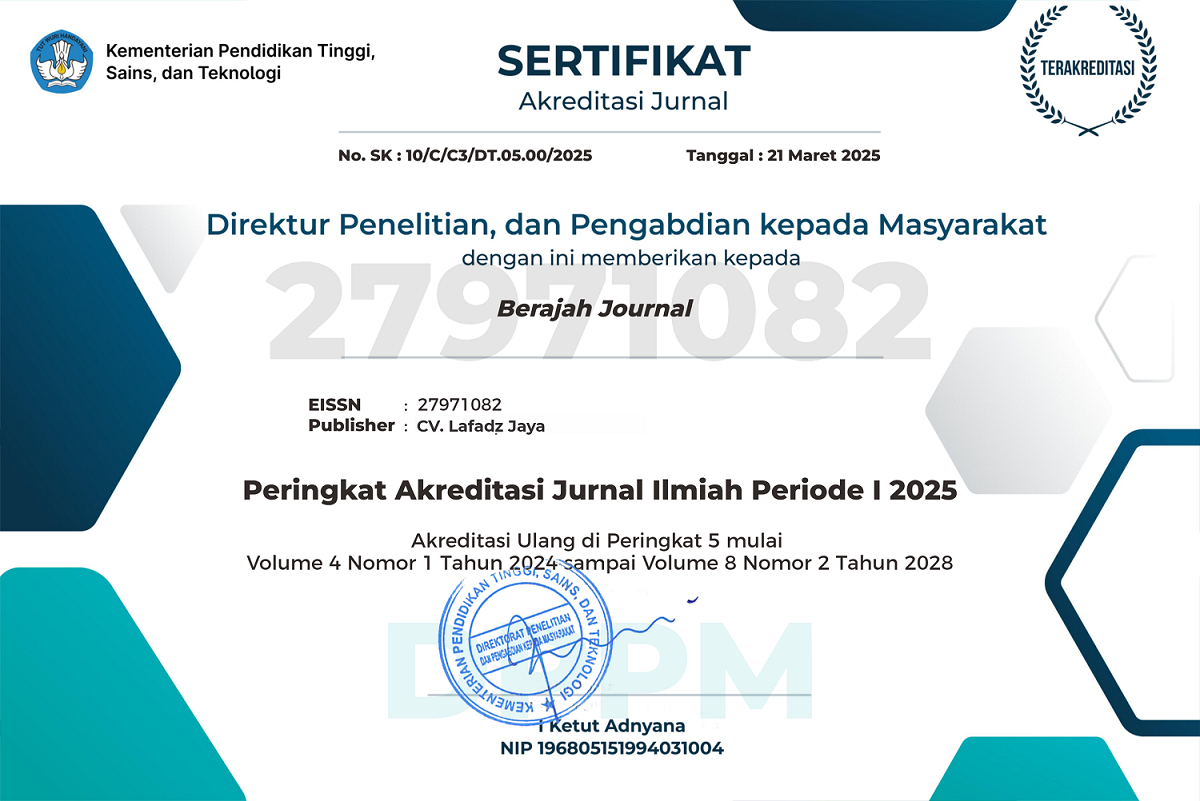PERAN KONEKSI POLITIK TERHADAP HUBUNGAN PENJUALAN KEPADA PIHAK BERELASI DENGAN NILAI PERUSAHAAN
DOI:
https://doi.org/10.47353/bj.v4i4.390Keywords:
firm value, related parties sales, political connectionsAbstract
This study aims to examine the role of political connections in the relationship between related party sales and firm values. The population of the study consists of non-financial companies listed on the Indonesia Stock Exchange from 2020 to 2023, totaling 2,309 companies. A sample of 74 companies, with 296 observations, was selected based on specific criteria. The data analysis method used is ordinary least square. The study finds that related party sales negatively impact firm value. Moreover, this negative impact is more pronounced in companies with political connections. These findings indicate that companies engaged in related party sales tend to experience a decrease in firm value, and political connections exacerbate this decline. Therefore, it is crucial for companies to consider the impact of political connections in related party sales activities to optimize firm value.
Downloads
References
Amin, Q. A., & Cumming, D. (2023). The politician as a CEO, corporate governance and firm value. Journal of International Financial Markets, Institutions and Money, 87(July), 101804. https://doi.org/10.1016/j.intfin.2023.101804
Bansal, S., & Thenmozhi, M. (2020). Does Concentrated Founder Ownership Affect Related Party Transactions? Evidence from an Emerging Economy. Research in International Business and Finance, 53, 101206. https://doi.org/10.1016/j.ribaf.2020.101206
Bona-Sánchez, C., Fernández-Senra, C. L., & Pérez-Alemán, J. (2017). Related-party transactions, dominant owners and firm value. BRQ Business Research Quarterly, 20(1), 4–17. https://doi.org/10.1016/j.brq.2016.07.002
Chen, C. R., Li, Y., Luo, D., & Zhang, T. (2017). Helping hands or grabbing hands? An analysis of political connections and firm value. Journal of Banking and Finance, 80, 71–89. https://doi.org/10.1016/j.jbankfin.2017.03.015
Chen, Y., Chen, C. H., & Chen, W. (2009). The impact of related party transactions on the operational performance of listed companies in china. Journal of Economic Policy Reform, 12(4), 285–297. https://doi.org/10.1080/17487870903314575
Downs, D. H., Ooi, J. T. L., Wong, W.-C., & Ong, S. E. (2016). Related Party Transactions and Firm Value: Evidence from Property Markets in Hong Kong, Malaysia and Singapore. The Journal of Real Estate Finance and Economics, 52(4), 408–427. https://doi.org/10.1007/s11146-015-9509-0
Ermad, E., Khaira, F., & Suemdra, D. (2022). Perang Utang pada Hubungan Kepemilikan Institusional dengan Penjualan Pihak Berelasi. Jurnal Ekonomi Dan Manajemen Teknologi, 6(2), 286–292.
Ermad, E., Umar, Z., & Suemdra, D. A. (2022). Komisaris Independen dalam Memoderasi Kepemilikan Institusional Terhadap Penjualan Pihak Berelasi. Jurnal Ekonomi Dan Manajemen Teknologi, 6(1), 35–42.
Hendratama, T. D., & Barokah, Z. (2020). Related party transactions and firm value: The moderating role of corporate social responsibility reporting. China Journal of Accounting Research, 13(2), 223–236. https://doi.org/10.1016/j.cjar.2020.04.002
Huang, D.-T., & Liu, Z.-C. (2010). A Study of the Relationship Between Related Party Transactions and Firm Value in High Technology Firms in Taiwan and China. African Journal of Business Management, 4(9), 1924–1931.
Jian, M., & Wong, T. J. (2010). Propping through related party transactions. Review of Accounting Studies, 15(1), 70–105. https://doi.org/10.1007/s11142-008-9081-4
Kang, M., Lee, H. Y., Lee, M. G., & Park, J. C. (2014). The association between related-party transactions and control-ownership wedge: Evidence from Korea. Pacific Basin Finance Journal, 29, 272–296. https://doi.org/10.1016/j.pacfin.2014.04.006
Kim, S., & Yoo, J. (2017). Does R&D expenditure with heavy related party transactions harm firm value? Sustainability (Switzerland), 9(7), 1–15. https://doi.org/10.3390/su9071216
Lee, J. M. (2019). Non-linear relationships among related party transactions, financial characteristics, corporate governance, and corporate value – Analysis of high-growth and low-growth food firms. Agricultural Economics (Czech Republic), 65(3), 123–132. https://doi.org/10.17221/228/2018-AGRICECON
Lei, A. C. H., & Song, F. M. (2011). Connected transactions and firm value: Evidence from China-affiliated companies. Pacific Basin Finance Journal, 19(5), 470–490. https://doi.org/10.1016/j.pacfin.2011.07.002
Lin, W. Y., Liu, Y. A., & Keng, I. (2010). Related party transactions, firm performance and control mechanisms: Evidence from Taiwan. International Research Journal of Finance and Economics, 35(35), 82–98.
Lo, A. W. Y., & Wong, R. M. K. (2016). Silence is golden? Evidence from disclosing related-party transactions in China. Journal of Accounting and Public Policy, 35(5), 540–564. https://doi.org/10.1016/j.jaccpubpol.2016.06.002
Nadiya, Ermad, & Ridzqy. (2023). Peran moderasi kepemilikan ssing terhadap hubungan penjualan kepada pihak berelasi dengan nilai erusahaan. ARBITRASE: Journal of Economics and Accounting, 4(1), 105–113. https://doi.org/10.47065/arbitrase.v4i1.856
Rocca, M. La, Fasano, F., Cappa, F., & Neha, N. (2022). The relationship between political connections and firm performance: An empirical analysis in Europe. Finance Research Letters, 49(May), 103157. https://doi.org/10.1016/j.frl.2022.103157
Rusnaidi, R., Tarmizi, T., & Dari, W. (2022). Efek Penghindaran Pajak , Tata Kelola , dan Sumber Pendanaan terhadap Nilai Perusahaan. Jurnal Ekonomi Dan Manajemen Teknologi, 6(2), 293–299.
Shahzad, F., Saeed, A., Asim, G. A., Qureshi, F., Rehman, I. U., & Qureshi, S. (2021). Political connections and firm performance: Further evidence using a generalised quantile regression approach. IIMB Management Review, 33(3), 205–213. https://doi.org/10.1016/j.iimb.2021.08.005
Trifonov, D. (2021). Political connections of Russian corporations: Blessing or curse? Journal of Behavioral and Experimental Finance, 29, 100458. https://doi.org/10.1016/j.jbef.2021.100458
Umar, Z., Ermad, E., & Suemdra, D. A. (2022). Efek Reputasi Kap dan Keterlambatan Laporan Auditor Independen Terhadap Ketepatan Waktu Penyampaian Laporan Keuangan. Jurnal Ekonomi Dan Manajemen Teknologi, 6(1), 14–20.
Wang, H. Da, Cho, C. C., & Lin, C. J. (2019). Related party transactions, business relatedness, and firm performance. Journal of Business Research, 101(January 2018), 411–425. https://doi.org/10.1016/j.jbusres.2019.01.066
Wang, J., & Yuan, H. (2012). The impact of related party sales by listed chinese firms on earnings informativeness and earnings forecasts. International Journal of Business, 17(3), 258–275.
Wang, W. K., Lu, W. M., Kweh, Q. L., & Siao, W. Y. (2019). Related-party transactions and corporate performance following the adoption of International Financial Reporting Standards in Taiwan. Managerial and Decision Economics, 41(3), 371–379. https://doi.org/10.1002/mde.3106
Wong, R. M. K., Kim, J. B., & Lo, A. W. Y. (2015). Are related-party sales value-adding or value-destroying? Evidence from China. Journal of International Financial Management and Accounting, 26(1), 1–38. https://doi.org/10.1111/jifm.12023
Zimon, G., Appolloni, A., Tarighi, H., Shahmohammadi, S., & Daneshpou, E. (2021). Earnings management, related party transactions and corporate performance: the moderating role of internal control. Risks, 9(8), 1–26. https://doi.org/10.3390/risks9080146
Downloads
Published
How to Cite
Issue
Section
License
Copyright (c) 2024 Ermad M.J, Rusnaidi, Zulkifli Umar, Dini Ajeng Savitri

This work is licensed under a Creative Commons Attribution 4.0 International License.






















